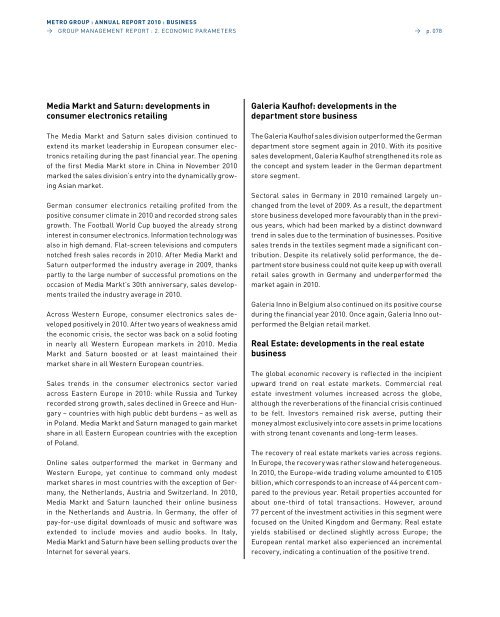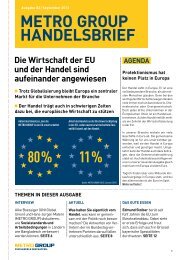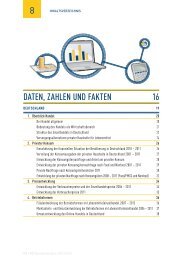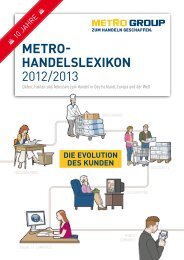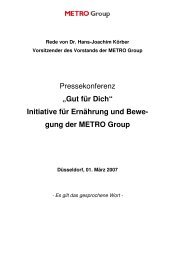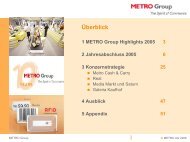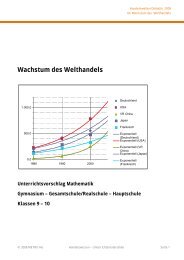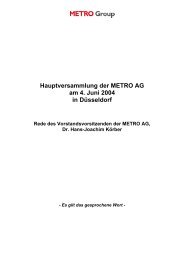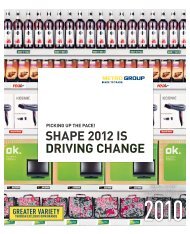pdf (2.5 MB) - METRO Group
pdf (2.5 MB) - METRO Group
pdf (2.5 MB) - METRO Group
You also want an ePaper? Increase the reach of your titles
YUMPU automatically turns print PDFs into web optimized ePapers that Google loves.
<strong>METRO</strong> GROUP : ANNUAL REPORT 2010 : BUSINESS<br />
→ GROUP MANAGEMENT REPORT : 2. ECONOMIC PARAMETERS<br />
Media Markt and Saturn: developments in<br />
consumer electronics retailing<br />
The Media Markt and Saturn sales division continued to<br />
extend its market leadership in European consumer electronics<br />
retailing during the past financial year. The opening<br />
of the first Media Markt store in China in November 2010<br />
marked the sales division’s entry into the dynamically growing<br />
Asian market.<br />
German consumer electronics retailing profited from the<br />
positive consumer climate in 2010 and recorded strong sales<br />
growth. The Football world Cup buoyed the already strong<br />
interest in consumer electronics. Information technology was<br />
also in high demand. Flat-screen televisions and computers<br />
notched fresh sales records in 2010. After Media Markt and<br />
Saturn outperformed the industry average in 2009, thanks<br />
partly to the large number of successful promotions on the<br />
occasion of Media Markt’s 30th anniversary, sales developments<br />
trailed the industry average in 2010.<br />
Across western Europe, consumer electronics sales developed<br />
positively in 2010. After two years of weakness amid<br />
the economic crisis, the sector was back on a solid footing<br />
in nearly all western European markets in 2010. Media<br />
Markt and Saturn boosted or at least maintained their<br />
market share in all western European countries.<br />
Sales trends in the consumer electronics sector varied<br />
across Eastern Europe in 2010: while Russia and Turkey<br />
recorded strong growth, sales declined in Greece and hungary<br />
– countries with high public debt burdens – as well as<br />
in Poland. Media Markt and Saturn managed to gain market<br />
share in all Eastern European countries with the exception<br />
of Poland.<br />
Online sales outperformed the market in Germany and<br />
western Europe, yet continue to command only modest<br />
market shares in most countries with the exception of Germany,<br />
the Netherlands, Austria and Switzerland. In 2010,<br />
Media Markt and Saturn launched their online business<br />
in the Netherlands and Austria. In Germany, the offer of<br />
pay-for-use digital downloads of music and software was<br />
extended to include movies and audio books. In Italy,<br />
Media Markt and Saturn have been selling products over the<br />
Internet for several years.<br />
Galeria Kaufhof: developments in the<br />
department store business<br />
→ p. 078<br />
The Galeria Kaufhof sales division outperformed the German<br />
department store segment again in 2010. with its positive<br />
sales development, Galeria Kaufhof strengthened its role as<br />
the concept and system leader in the German department<br />
store segment.<br />
Sectoral sales in Germany in 2010 remained largely unchanged<br />
from the level of 2009. As a result, the department<br />
store business developed more favourably than in the previous<br />
years, which had been marked by a distinct downward<br />
trend in sales due to the termination of businesses. Positive<br />
sales trends in the textiles segment made a significant contribution.<br />
despite its relatively solid performance, the department<br />
store business could not quite keep up with overall<br />
retail sales growth in Germany and underperformed the<br />
market again in 2010.<br />
Galeria Inno in Belgium also continued on its positive course<br />
during the financial year 2010. Once again, Galeria Inno outperformed<br />
the Belgian retail market.<br />
Real Estate: developments in the real estate<br />
business<br />
The global economic recovery is reflected in the incipient<br />
upward trend on real estate markets. Commercial real<br />
estate investment volumes increased across the globe,<br />
although the reverberations of the financial crisis continued<br />
to be felt. Investors remained risk averse, putting their<br />
money almost exclusively into core assets in prime locations<br />
with strong tenant covenants and long-term leases.<br />
The recovery of real estate markets varies across regions.<br />
In Europe, the recovery was rather slow and heterogeneous.<br />
In 2010, the Europe-wide trading volume amounted to €105<br />
billion, which corresponds to an increase of 44 percent compared<br />
to the previous year. Retail properties accounted for<br />
about one-third of total transactions. however, around<br />
77 percent of the investment activities in this segment were<br />
focused on the United Kingdom and Germany. Real estate<br />
yields stabilised or declined slightly across Europe; the<br />
European rental market also experienced an incremental<br />
recovery, indicating a continuation of the positive trend.


